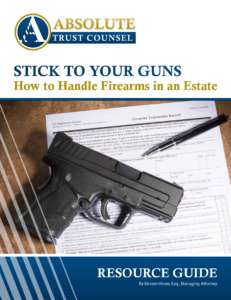Lost in her latest romance novel, Lydia didn’t notice her husband’s return until he dropped a burlap sack on her lap. She glared at him. “What’s this?” she asked. “Open it,” her husband, Dan, replied. “It’s a gift from my grandfather.”
Lydia opened the bag and looked inside. “Guns? He left you guns?” Dan took the bag from her and pulled out a pistol. “This is from his World War II days. He also left me the shotgun he used for hunting.” Lydia shuddered. “I’m not sure I want those around the house.”
Dan laughed. “I’m going to keep the shotgun for hunting and give the pistol to my sister, Mary. She’s always talking about getting a gun. Seems smart to give it to someone who might actually use it.”
Lydia’s eyes narrowed. “Is that even legal?” Dan shrugged. “I inherited them, I think I can do whatever I want with them.”
Lydia snorted. “You don’t even know how to handle a gun. First thing you’ll do is shoot your eye out. Then you’ll probably get arrested for operating a gun without a license. I can’t imagine you can keep those guns without registering them. California has pretty strict gun laws.”
Dan waved her off. “Harry inherited his father’s guns. He didn’t do anything. No one said a thing.” Lydia shook her head. “Then he’s a very stupid man. You don’t mess around with guns, no matter where they came from. You need to talk to an attorney before you get yourself into trouble.”
If you inherit a firearm in California you are required by law to register the transfer of ownership or in some cases, dispose of it. However, the rules regarding that transfer depend on your relationship to the testator (the maker of the document bequeathing the firearm)), as well as the type of firearm bequeathed.
For example, normally the transfer of gun ownership is handled by a Federal Firearm Licensed (FFL) dealer. The gun is held by the dealer during the mandatory 10-day waiting period and the parties are required to complete a Dealer’s Record of Sale (DROS). That initiates a background check with the state Department of Justice. In addition, gun purchasers are required to secure a Firearm Safety Certificate before taking possession of the gun.
However, those rules do not apply to the transfer of a firearm by gift, bequest, intestate succession, or other means if the following requirements are met:
- The testator is a California resident.
- The person receiving the firearm is 18 years of age or older.
- The transfer is “infrequent” (defined as less than six transactions per year or for firearms not handguns, occasional and without regularity).
- The transfer is between immediate family members (parent and child, grandparent and grandchild, or spouse).
- Before taking possession of the firearm, the new owner completes a firearms safety course and receives a Firearm Safety Certificate. However, if the new owner is taking possession of a handgun, an existing unexpired handgun safety certificate may be used.
- Within 30 days of taking possession of the firearm, the new owner provides the California Department of Justice with a completed Intrafamilial Firearm Transaction report.
- The weapon being transferred is not an assault weapon.
When a registered assault weapon is included in an estate, California law requires one of the following to occur within 90 days:
- The estate must sell it to an FFL dealer,
- The estate must transport the weapon out of state,
- The estate must register the weapon with the state Department of Justice, or,
- The estate must render the weapon inoperable.
Unregistered assault weapons must be isolated from other assets in the estate and turned over to law enforcement. All related ownership documents must accompany the weapon and will be destroyed.
Reference Guide 4:
How to Handle Firearms in an Estate
Are you an executor of an estate that includes a firearm? While they do require special consideration, it is possible to safely and legally transfer possession. Download your FREE copy of Stick to Your Guns: How to Handle Firearms in an Estate checklist to understand what the requirements are and to help get the process started. If you’re new or inexperienced with handling firearms, then you’ll definitely want to have this resource on hand.
California requires that the following inherited firearms be disposed of:
- Firearms with altered serial numbers.
- Long guns with barrels that have been modified to less than 18.25 inches.
California also recommends that the following be disposed of:
- Low value firearms not wanted by an heir or beneficiary
- Low value firearms an heir or beneficiary cannot take or legally possess.
For more information on inheriting firearms, please visit the following websites or contact your attorney:
- CA Department of Justice: https://oag.ca.gov/firearms
- CALGUNS: http://www.calguns.net
- GUNSAMERICA: https://www.gunsamerica.com/
- GUN BROKER: http://www.gunbroker.com/
[Ad] Do you need help with your California estate planning now? We can help. Together our Absolute Trust Counsel team will take a look at your situation and your specific needs to develop a strategic plan to help protect you and your loved ones. Here’s a link to schedule your free discovery today > https://absolutetrustcounsel.com/scheduling/.
Looking for more resources? Absolute Trust Counsel has a library of free articles, checklists, and guidebooks to address the most common estate planning questions in easy-to-understand language. Explore those listed below, or for more, visit https://absolutetrustcounsel.com/resources.


